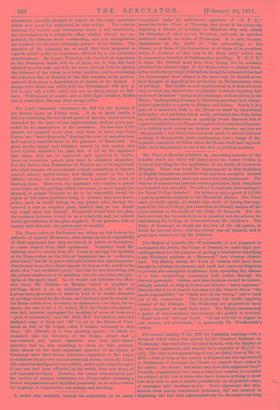The Bishop of Lincoln (Dr. Wordsworth) is not prepared to
recommend his friend, the Vicar of Owston, to resist legal pro- ceedings-taken for• the purpose of getting a tombstone describing a late Wesleyan minister as " Reverend " into Owston church- yard. The Bishop thinks the Vicar of Owston will have done enough in refusing his consent, and need not resort to litigation to prevent the contagious tombstone from spreading the disease of a false terminology concerning holy orders through the Owston graveyard. Schism and false doctrine should be unhesi- tatingly resisted, so long-as it does not involve "heavy expenses." Directly that is to be feared, it is safer for the Vicar to throw "the moral responsibility" on "those who do the wrong," and to back out of the controversy. That is prudent, but hardly inspiring counsel of the Bishop's. The Wesleyan are prepared to incur heavy expenses' to carry their point. The Bishop recommends a policy of non-resistance the moment the pocket is touched. " Resist not evil " said our Lord. " Resist evil till it begins to cost money, not afterwards," is apparently Dr. Wordsworth's version.


































 Previous page
Previous page